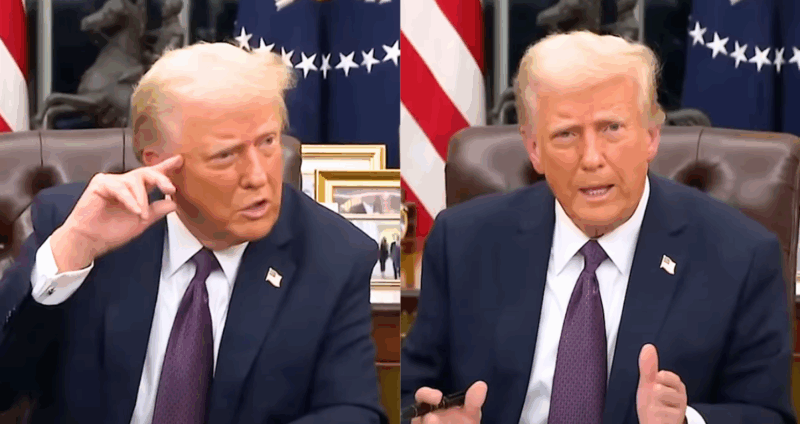Four-Letter Mocking Term Angers Trump After His Agenda Dealt Catastrophic Blow
Four-Letter Mocking Term Angers Trump After His Tariff Agenda Dealt Catastrophic Blow by Judges Who Rule Worldwide Trade Levies ‘Illegal’
A federal court delivered a devastating setback to President Donald Trump’s trade policy Wednesday, ruling his sweeping global tariffs illegal and blocking their implementation in a decision that sent markets soaring.
The three-judge panel at the New York-based Court of International Trade sided with Democratic-led states and small businesses who challenged Trump’s authority to impose the widespread levies.
The court determined that Trump exceeded his presidential powers when he invoked emergency law to justify the tariffs on virtually every U.S. trading partner.
Wall Street traders have begun using the acronym “TACO trade,” standing for “Trump Always Chickens Out,” to describe the president’s pattern of threatening massive tariffs before backing down.
When confronted about the mocking term by CNBC reporter Megan Cassella on Wednesday, Trump angrily denied backing down and defended his negotiation strategy.
“Don’t ever say what you said,” Trump told Cassella.
“That’s a nasty question. To me, that’s the nastiest question.”
Trump characterized his approach as negotiation, explaining that setting high initial numbers allows room for adjustment during talks.
“It’s called negotiation. You set a number, and if you go down, you know, if I set a number at a ridiculous high number, I go down a little bit, you know, a little bit they want me to hold that number, 145 percent tariff even. I said man, that really got up,” he said.
Financial Times columnist Robert Armstrong reportedly coined the “TACO” term in his criticisms of Trump’s tariff strategy, per the Daily Mail.
The “TACO” acronym has gained particular traction among investors following Trump’s pattern of threatening shock tariffs, such as a 50 percent levy on the European Union, before announcing sudden pauses that cause significant market volatility.
This pattern has led some traders to view tariff threats as negotiating tactics rather than firm policy commitments.
Markets responded immediately to the ruling, with Asian shares advancing and U.S. futures jumping significantly following the announcement.
The S&P 500 future climbed 1.6 percent while the Dow Jones Industrial Average future gained 1.2 percent in early trading.
The court specifically referenced the 1977 International Emergency Economic Powers Act in its ruling, stating that Trump’s actions exceeded any authority granted to the president.
“The Worldwide and Retaliatory Tariff Orders exceed any authority granted to the President by IEEPA to regulate importation by means of tariffs,” the judges wrote in their decision.
The White House immediately condemned the ruling, with officials arguing that unelected judges lack authority to interfere with Trump’s emergency actions.
White House spokesman Kush Desai defended the administration’s position, stating that foreign countries’ treatment of the United States has created historic trade deficits.
“Foreign countries’ nonreciprocal treatment of the Unites States has fueled America’s historic and persistent trade deficits,” Desai said.
“These deficits have created a national emergency that has decimated American communities, left our workers behind, and weakened our defense industrial base – facts that the court did not dispute.”
The spokesman emphasized that unelected judges should not determine how to address national emergencies, adding that Trump remains committed to putting America first.
“It is not for unelected judges to decide how to properly address a national emergency. President Trump pledged to put America First, and the Administration is committed to using every lever of executive power to address this crisis and restore American Greatness,” Desai continued.
Stephen Miller, one of Trump’s closest White House aides, responded more forcefully on social media, characterizing the decision as a judicial coup that has spiraled out of control.
The Daily Mail reported that the Trump administration plans to appeal the ruling, setting up a legal battle that will likely reach the Supreme Court.
The court’s decision focused on the sweeping 10 percent tariffs Trump imposed on virtually every U.S. trading partner last month, along with higher tariffs threatened against dozens of countries.
Trump had relied on the 1977 federal emergency law to justify various levies, including duties on Canada, Mexico and China related to fentanyl smuggling.
This is in addition to reciprocal tariffs on nearly all trading partners implemented in early April.
The president later paused the reciprocal tariffs for 90 days to allow for negotiations with affected countries.
At least seven separate lawsuits challenged the tariffs, which represented the cornerstone of Trump’s trade policy agenda.
The federal trade court ruled in two distinct cases brought by businesses and a coalition of state governments, both arguing that Trump’s actions violated Congress’s constitutional power of the purse.
The three-judge panel questioned whether the International Emergency Economic Powers Act delegates unlimited tariff authority to the president for goods from nearly every country worldwide.
“The court does not read IEEPA to confer such unbounded authority and sets aside the challenged tariffs imposed thereunder,” the judges wrote in their unsigned opinion.
The court emphasized that any interpretation of the law granting unlimited tariff authority would be unconstitutional, according to court documents.
International markets reacted positively to the ruling, with Japan’s Nikkei 225 index jumping 1.5 percent to 38,263.36 following the announcement.
Japan, America’s largest ally in Asia, has been actively appealing to Trump to cancel tariffs on Japanese imports and halt 25 percent tariffs on steel, aluminum, and automobiles.
The ruling also strengthened the dollar against the Japanese yen, with currency trading at 146.06 yen early Thursday, up from 144.87 yen late Wednesday.
Australia’s S&P/ASX 200 gained 0.3 percent to 8,418.90, while South Korea’s Kospi surged 1.4 percent to 2,707.77, benefiting from both the court ruling and the Bank of Korea’s decision to cut interest rates.
Trump had announced the global tariffs during a massive Rose Garden ceremony in April that he called “Liberation Day,” targeting most countries worldwide to address longstanding trade deficits.
WATCH:
Continue Scrolling for the Comments
